| Srl | Item |
| 1 |
ID:
165273
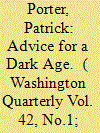

|
|
|
| 2 |
ID:
192087
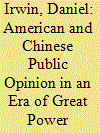

|
|
|
|
|
| Summary/Abstract |
As the US-China great power competition intensifies, public opinion polling may help gauge internal drivers of foreign policy decision-making. Using Pew Research Center data, the authors analyzed how American and Chinese respondents viewed their own and each other’s countries between 2008–2016. They further examined how American attitudes towards China varied by political affiliation between 2008–2019. Both Americans and the Chinese displayed ingroup bias (i.e. rating their own country more positively than the other) and viewed China as a challenger to US hegemony. However, while the Chinese exhibited higher levels of ingroup bias overall, there was no evidence of increasing bias over time. Meanwhile, Americans showed increasing ingroup bias, primarily due to their souring evaluations of China, a tendency that was strongest among Republicans.
|
|
|
|
|
|
|
|
|
|
|
|
|
|
|
|
| 3 |
ID:
129344
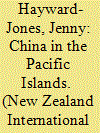

|
|
|
| 4 |
ID:
150095
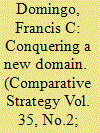

|
|
|
|
|
| Summary/Abstract |
This article explains why powerful states develop capabilities for warfare in cyberspace. It argues that despite the apparent limited strategic utility of cyberspace, powerful states develop cyber capabilities to compete for military dominance in the international system. This argument is best explored using a neorealist framework because it provides the most compelling explanation for the competitive behavior of states in cyberspace. Three key implications can be derived from the study: the proliferation of capabilities for warfare in cyberspace is inevitable; powerful states will still dominate cyberspace; and cyberattacks may escalate to kinetic attacks due to the uncertainties regarding existing cyber capabilities.
|
|
|
|
|
|
|
|
|
|
|
|
|
|
|
|
| 5 |
ID:
175888
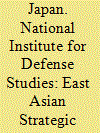

|
|
|
|
|
| Publication |
Tokyo, National Institute For Defense Studies, 2020.
|
| Description |
x, 217p.Pbk
|
| Standard Number |
9784864820844
|
|
|
|
|
|
|
|
|
|
|
|
Copies: C:1/I:0,R:0,Q:0
Circulation
| Accession# | Call# | Current Location | Status | Policy | Location |
| 059919 | 355.0095/JAP 059919 | Main | On Shelf | General | |
|
|
|
|
| 6 |
ID:
180279


|
|
|
|
|
| Publication |
Tokyo, National Institute for Defnse Studies, 2021.
|
| Description |
xii, 275p.pbk
|
| Standard Number |
9784864820974
|
|
|
|
|
|
|
|
|
|
|
|
Copies: C:1/I:0,R:0,Q:0
Circulation
| Accession# | Call# | Current Location | Status | Policy | Location |
| 060048 | 355.0095/JAP 060048 | Main | On Shelf | General | |
|
|
|
|
| 7 |
ID:
160726
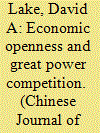

|
|
|
|
|
| Summary/Abstract |
The United States–China relationship is more likely than not to slide into economic and military competition, despite the perhaps best intentions of both states. This new bipolar competition is not inevitable. The key question is whether both governments have the self-restraint to limit domestic rent-seeking interests who will undoubtedly demand protection at home and exclusivity in their spheres of influence abroad. If not, the new superpowers will, like great powers in the past, ‘race’ for economic privileges that can quickly divide the world up into exclusive blocs. Like the security dilemma, great powers need not actually exclude one another from their economic zones; the fear of exclusion alone is enough to ignite the process of division. There was always some likelihood of a competitive economic spiral given China’s close business–government relations in a ‘state-capitalist’ economy. Now, for the first time in seven decades, there is a chance that the United States, in the grips of economic nationalism, might abandon its historic policy of free trade and ignite a new race for economic privilege as well.
|
|
|
|
|
|
|
|
|
|
|
|
|
|
|
|
| 8 |
ID:
178737
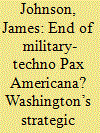

|
|
|
|
|
| Summary/Abstract |
This article uses the international relations (IR) ‘polarity’ concept as a lens to view the shifting great power dynamics in artificial intelligence (AI) and related enabling technologies. The article describes how and why great power competition is mounting in within several interrelated dual-use technological fields; why these innovations are considered by Washington to be strategically vital, and how (and to what end) the United States is responding to the perceived challenge posed by China to its technological hegemony. The following questions addressed in this paper fill a gap in the existing literature: Will the increasingly competitive U.S.-China relationship dominate world politics creating a new bipolar world order, as opposed to a multipolar one? Why does the U.S. view China’s progress in dual-use AI as a threat to its first-mover advantage? How might the U.S. respond to this perceived threat?
|
|
|
|
|
|
|
|
|
|
|
|
|
|
|
|
| 9 |
ID:
114926
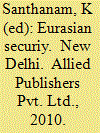

|
|
|
|
|
| Publication |
New Delhi, Allied publishers Pvt. Ltd., 2010.
|
| Description |
xx,159p.
|
| Standard Number |
9788184246414
|
|
|
|
|
|
|
|
|
|
|
|
Copies: C:1/I:0,R:0,Q:0
Circulation
| Accession# | Call# | Current Location | Status | Policy | Location |
| 056803 | 355.00958/SAN 056803 | Main | On Shelf | General | |
|
|
|
|
| 10 |
ID:
192593


|
|
|
|
|
| Summary/Abstract |
This article seeks a debate on the future of the US defense posture in the Great Power Competition. It contains a robust list of defense initiatives to consider in improving the US defense posture. Since the United States is no longer in combat operations in CENTCOM, now is the time to focus on changing the US defense posture and program to meet the challenges of the emerging security environment. The article details where the United States stands and major changes that should be made, emphasizing both conventional and strategic nuclear forces.
|
|
|
|
|
|
|
|
|
|
|
|
|
|
|
|
| 11 |
ID:
193456


|
|
|
|
|
| Summary/Abstract |
The great power competition in the Indo-Pacific will continue in coming years. However, a lot will also depend on strategic choices made by the middle and small powers that would play a critical role in deciding the trajector y and outcome of this rivalry. All types of power would be employed to achieve strategic gains over rivals. One cannot speculate how this competition would end. There is no clear answer whether this rivalry would turn into a war in times to come.
|
|
|
|
|
|
|
|
|
|
|
|
|
|
|
|
| 12 |
ID:
184508


|
|
|
|
|
| Summary/Abstract |
Confronting major powers, especially Russia, to say nothing of smaller powers like Iran, also requires counterterrorism tools, but what that means in practice differs considerably from the fight against non-state groups.
|
|
|
|
|
|
|
|
|
|
|
|
|
|
|
|
| 13 |
ID:
177878


|
|
|
|
|
| Summary/Abstract |
The return of great power rivalry has been the defining feature of the 21st century. Since the beginning of the new millennium, China and Russia have openly defied the United States and upset the stability of the liberal international order. Both China and Russia share physical and material attributes possessed by the United States that are traditionally required for great power status: land mass, a sea portal, a large population, and technology to field and develop a competitive military capability. Most scholars and policymakers agree that China presents the largest challenge to US interests and the US-led liberal international order. Economic and military growth in China has been astounding, surpassing Russian expansion. China’s outward extension is not primarily resource-based as is Russia’s but multidimensional, posing a structural challenge to US military and economic dominance.
|
|
|
|
|
|
|
|
|
|
|
|
|
|
|
|
| 14 |
ID:
189961
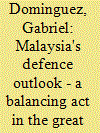

|
|
|
| 15 |
ID:
192541
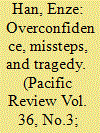

|
|
|
|
|
| Summary/Abstract |
This paper makes a novel contribution by examining the puzzle of one Southeast Asian nation, Myanmar, and its dramatic shift of ‘fortune’ in its international status and the domestic consequences of that shift during the decade of 2010–2020. It highlights how the country’s changing international relations affected its domestic political decision-making process. It puts forth the argument that the amount of international attention the country received since 2011 as the target of competitive courtship between China, United States, and the West in general, and the consequent feeling of being valued as a geostrategic asset, created strong conditions for overconfidence on part of Myanmar’s government and military. This favorable international environment also coincided with perceived progress in democratization domestically. Similar to its past patterns of behavior toward ethnic minorities, the Myanmar military and the government overestimated their likelihood of success in dealing with the Rohingya minority while underestimating the likelihood of punishment by the international community.
|
|
|
|
|
|
|
|
|
|
|
|
|
|
|
|
| 16 |
ID:
114375
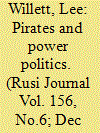

|
|
|
| 17 |
ID:
178145


|
|
|
| 18 |
ID:
180500
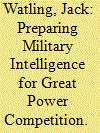

|
|
|
|
|
| Summary/Abstract |
Military intelligence (MI) is critical to visions of future war. The analytical methodologies of the War on Terror have reshaped how MI teams are trained and deployed. MI personnel are increasingly specialised, with experience and judgement being replaced by rigid adherence to robust data-driven analytical methodologies. While these methods are likely to continue at higher echelons, Jack Watling argues that a large MI presence at the tactical edge will not be practical under the indirect fire threat on the future battlefield. Furthermore, reach-back to higher echelon support will be severely constrained in a contested electromagnetic environment. Tactical echelons will therefore need an expanded organic MI capability, with experienced personnel able to perform a wide range of MI functions.
|
|
|
|
|
|
|
|
|
|
|
|
|
|
|
|
| 19 |
ID:
181345


|
|
|
|
|
| Summary/Abstract |
Russia has come to occupy an anomalous position in Western strategic thought. While former US president Barack Obama dismissed Russia as a “regional power” following its 2014 occupation of Crimea and invasion of eastern Ukraine, both the Trump and Biden administrations have identified Russia as one of the United States’ principal rivals in an era defined by strategic competition among great powers.1 To a significant degree, though, the United States continues to think about Russia as more of a disruptor than a true great power rival. Though widespread, that view misreads both the nature and the durability of Russian power and underestimates the extent to which Russia remains a potent competitor whose preferences Western leaders will have to take into account.
|
|
|
|
|
|
|
|
|
|
|
|
|
|
|
|
| 20 |
ID:
170679
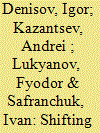

|
|
|
|
|
| Summary/Abstract |
This article builds on extensive debates on the role of BRICS in world order. But instead of focusing on BRICS’ impact on the world order, the article takes a different methodological approach. It traces how much the evolution of BRICS’ rational was prompted by changes of the international system and Russia’s and China’s grand strategies. The key finding is that the BRICS does not determine major world developments, but acclimatizes to the evolving international situation. Particular attention is paid to how the BRICS has adapted to the rise of great power politics and competition in recent years.
|
|
|
|
|
|
|
|
|
|
|
|
|
|
|
|